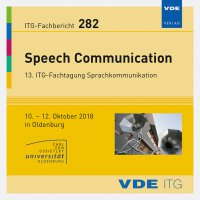Resource Allocation for Distributed Blind Source Separation
Conference: Speech Communication - 13. ITG-Fachtagung Sprachkommunikation
10/10/2018 - 10/12/2018 at Oldenburg, Deutschland
Proceedings: Speech Communication
Pages: 5Language: englishTyp: PDF
Personal VDE Members are entitled to a 10% discount on this title
Authors:
Bachmann, Markus; Brendel, Andreas; Kellermann, Walter (Multimedia Communications and Signal Processing, University of Erlangen-Nuremberg, 91058 Erlangen, Germany)
Abstract:
The real-time capability of the TRINICON (TRIple-N-Independent component analysis for CONvolutive mixtures) framework for Blind Source Separation (BSS) is not guaranteed for devices of low computational power like the ones typically used in sensor networks. In order to ensure real-time capability in this case, as many algorithmic parts as possible are distributed on the available nodes. This should lead to an optimal resource exploitation for a given network model which accounts for the data rates and latencies of the links between the nodes and for the computational power of the nodes themselves. The simulation results for homogeneous and heterogeneous networks show that TRINICON-BSS is still possible even if the adaptation exploits only parts of the originally intended signal.


